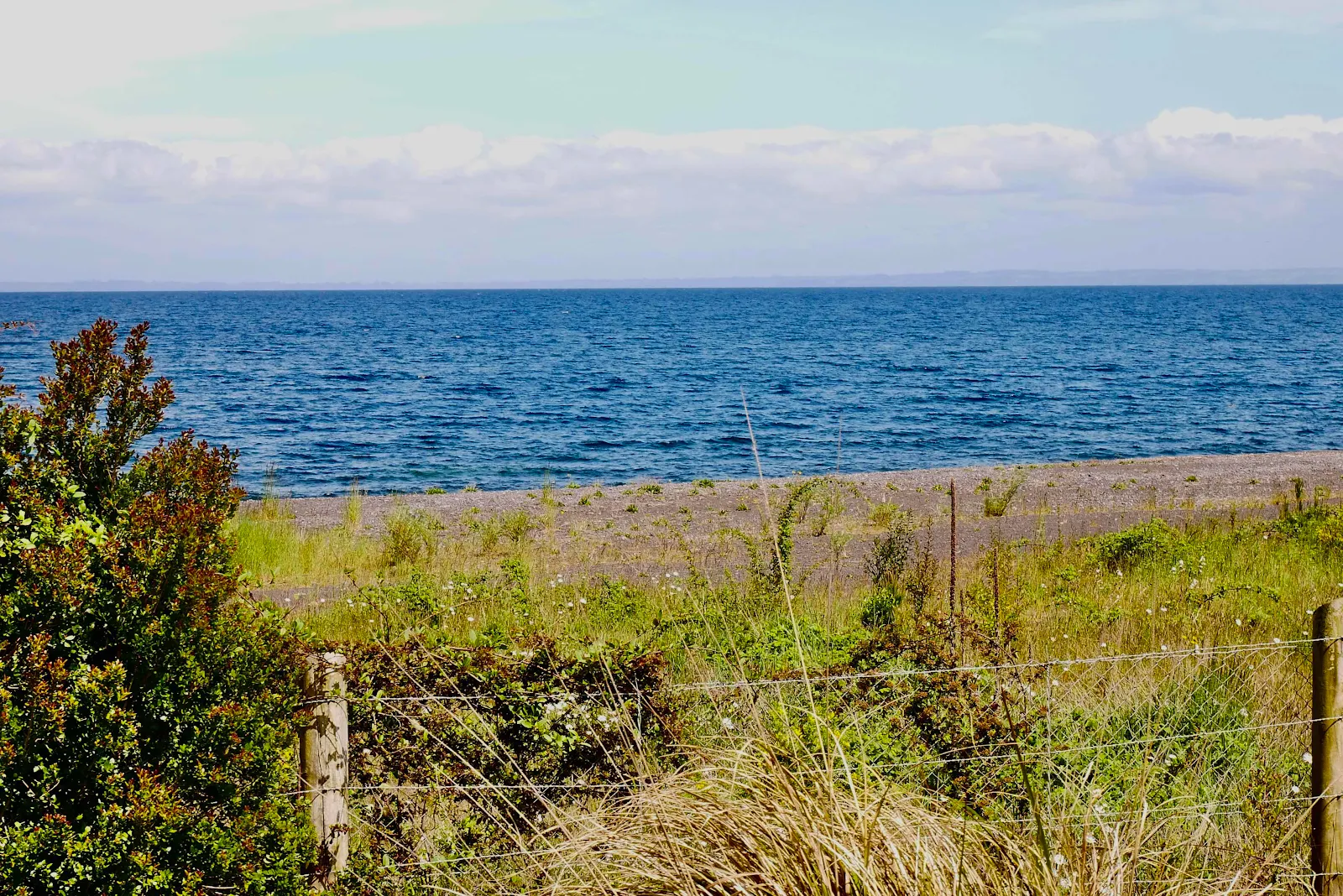We had met a Chilean family on the beach in Peru in their motorhome and they had suggested some places with visiting. Puerto Octay was one such and it turned out really well.
The day was a bit overcast and gray so the light was flat but as we descended into the little town we were ready for a break and a walk after three hours driving from our last stop in Valdivia.
The museum we had planned to visit was closed so we went for a walk through the immaculately maintained park in the center of town.
It’s off season still so there weren’t many people around but the two park maintenance men mentioned some other spots to see. You will notice there is not a speck of trash.
Lake Llanquihue (pronounced “yankee-way”) is the second largest in Chile and we ended up circumnavigating it,bin about an hour’s drive, catching occasional glimpses through the thick foliage lining the road. More to the point the lake in the early days of European settlement, was a highway and Puerto Octay was the point of departure for goods and people traveling here from the provincial capital of Osorno. Nowadays it’s a sleepy yet delightful little tourist village.
It is pretty big, similar perhaps to Lake Okeechobee except there are hills around here. And a pretty dominant volcano. 
iOverlander had a campground listed but it didn’t sound very appealing so we drove down to the wild camp spot suggested near the lakefront.
We didn’t get her name but she told us about the last eruption of the Osorno volcano across the lake, when it just started spewing smoke into the sky one day in 2017. She showed us photos of the column of smoke and ash rising ten miles into the sky. She noted with a wicked smile that they got no debris in Puerto Octay as the winds blew the ash into the Argentine town of Bariloche on the other side of the mountains. Later that night many townspeople fled as the earth started shaking like a three hour earthquake but she stayed home with her cats. Then the next day everything stopped and that was that. She was about as blasé as one might be about hurricanes if one lived in Florida.
She also told us about some rather beautiful waterfalls which we had never heard of and they merit a post of their own tomorrow.
That was election night, rainy windy and cold and not as sleep filled as I might have liked but the day dawned sunny making the lake more beautiful than ever.
We went downtown to wait for the museum to open and wandered the main square filled with really loud noisy birds honking like geese.
Even on sunny days the temperature struggles to reach 65 degrees so it’s really quite pleasant after the sundress the cold damp night air. Getting out of bed is a chore for someone who likes heat. Luckily the Promaster has a powerful dashboard vent.
Rusty stayed close as he found the squawking birds overpowering.
I saw long gray streamers fall through the branches of the trees in the square when I suddenly realized what they were. You don’t want to be standing under these creatures whatever they are called.
But as always there is no trash; you have no idea how delightful that is after Peru.
I’ll bet this place is packed in summer.
The museum told the story of prehistoric settlement possibly 12,000 years ago in what was a fertile well watered valley.
The early 19th century saw Spain lose all her South American colonies and Chile figured out they like Argentina needed European settlers.
The museum blamed the demise of the local indigenous populations on Spanish slavery and in their place Chile opened up the area north of Puerto Montt to German immigrants.
However there was a 200 year period where the Indians living around these lakes kept the Europeans at bay, forcing them to keep out of these lands and occupy a hollow Island to the south and stay close to Santiago in the north. But in the end the lure of rich agricultural pickings in these volcanic lands meant that the war could only end one way.
There came a wave of German migrants around 1850 which coincidentally was a time of revolution and uncertainty in Europe. 1848 and seen a bunch of revolts against the people in charge and I’m thinking a lot of people would have preferred to be farming in distant peaceful Chile.
They did well too, and left their mark here to this day.
Puerto Octay was a busy steamer port until 1956 when road traffic finally knocked the last steamer out of service.
The German colony thrived and today the German influence is celebrated with beer and baked products everywhere produced by Chileans with German last names.
A euphonium played in the town band built in Hamburg in 1828. I learned to play it in school so I was drawn to this particular instrument.
The word “kuchen” is used in Chile even now to mean a German pastry.
And so we took off to see the waterfalls.
1 comment:
Beautiful mountain (other than the eruptions and stuff).
Post a Comment